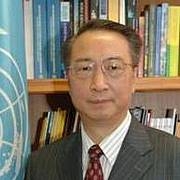From 6th- 15th September, the World Conservation Congress of the International Union for Conservation of Nature (IUCN) was held on the Island of Jeju, Republic of Korea. Held every four years, the congress is known as the Olympics of environmental area as the world’s largest and most important conservation event. During the session, Mr. Zhang Xinsheng, Chairman of WHITRAP’s Governing Board and Executive Chairman of Eco-Forum Global was elected as the new president of IUCN, which marks the first time in its 64-year history that the IUCN has chosen a president from East Asia.
Founded in 1948, IUCN is the world’s first global environmental organization, with more than 1,200 member organizations including 200+ government and 900+ non-government organizations, as well as almost 11,000 voluntary scientists and experts, grouped in six Commissions in some 160 countries. As the most authoritative organization in the sources of global natural resources distribution and conditions, IUCN has exerted significant influence in the ecological and environmental protection areas. In 1996, China became a State member of IUCN, represented by the Ministry of Foreign Affairs. IUCN has a long history of involvement in China since the early 1980s. To date, it has 21 members in China with more than 270 scientists in the Commissions. The IUCN China Liaison Office was established in 2003 and IUCN China Country Representative Office in 2012. As an advisory body designated by the World Heritage Convention, IUCN plays an important role in inscriptions into the World Heritage List.
Many delegations present in the Congress have said that as the most populous developing country in the world, China has achieved significant outcomes in both economic social development and ecological and environmental protection. China is also among one of the most successful countries in poverty reduction and the ones with the most affluent biodiversity resources. The election of a Chinese candidate makes a good significance of both China and Asia, particularly those emerging economies and regions, by bettering accomplishment of its missions, and improving works done by IUCN offices and economies to make contributions to protection and sustainable development of natural environment in the globe.
After elected, Mr. Zhang Xinsheng said that IUCN serves as an important global organization in gathering politics, academics, international and civil organizations, communities and enterprises to cooperate on issues of environmental protection and sustainable development, and it also possesses a strong scientific and practical basis in terms of biodiversity and protection of ecological systems.
Upon listening to various opinions, Mr. Zhang promised to promote the implementation of the conservation strategies for the next 4 years and gave priories to the following three areas: 1. To promote the evaluation and conservation of nature and its service functions; 2. To establish the optimized governance in terms of the natural spectrum and its effective and equal utilization; 3. To explore solutions based on the nature, and better the tackling against climate change, food safety and other challenges in the globe.

|



